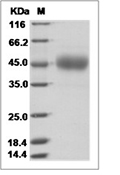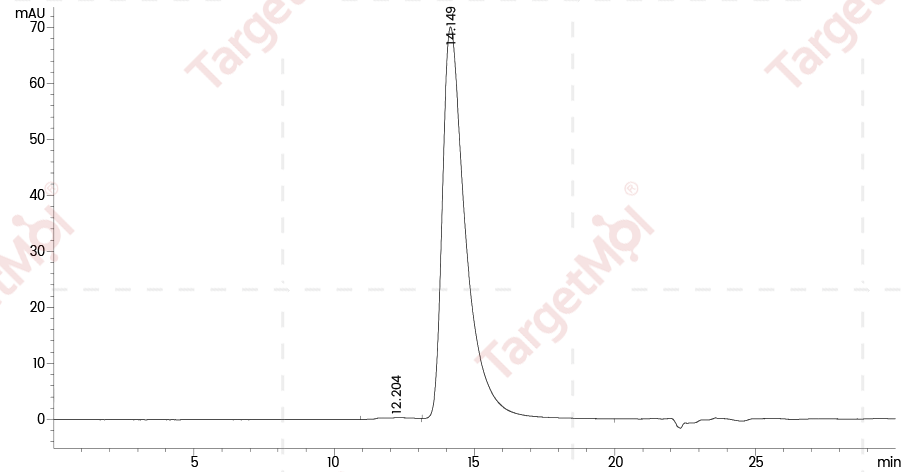Shopping Cart
Remove All Your shopping cart is currently empty
Your shopping cart is currently empty
Siglec-3/CD33 Protein, Human, Recombinant is expressed in HEK293 mammalian cells. The predicted molecular weight is 27.4 kDa and the accession number is AAH28152.1.

| Pack Size | Price | USA Warehouse | Global Warehouse | Quantity |
|---|---|---|---|---|
| 5 μg | $44 | 7-10 days | 7-10 days | |
| 10 μg | $68 | 7-10 days | 7-10 days | |
| 20 μg | $108 | 7-10 days | 7-10 days | |
| 50 μg | $198 | 7-10 days | 7-10 days | |
| 100 μg | $347 | 7-10 days | 7-10 days | |
| 200 μg | $583 | - | In Stock |
| Biological Activity | Activity testing is in progress. It is theoretically active, but we cannot guarantee it. If you require protein activity, we recommend choosing the eukaryotic expression version first. |
| Description | Siglec-3/CD33 Protein, Human, Recombinant is expressed in HEK293 mammalian cells. The predicted molecular weight is 27.4 kDa and the accession number is AAH28152.1. |
| Species | Human |
| Expression System | HEK293 Cells |
| Tag | Tag Free |
| Accession Number | AAH28152.1 |
| Synonyms | Siglec-3,SIGLEC3,p67,CD33 molecule |
| Construction | A DNA sequence encoding the human CD33 (AAH28152.1) (Met1-His259) was expressed with five amino acids (DDDDK) at the C-terminus. Predicted N terminal: Asp 18 |
| Protein Purity | ≥ 95 % as determined by SDS-PAGE. ≥ 95 % as determined by SEC-HPLC.   |
| Molecular Weight | 27.4 kDa (predicted) |
| Endotoxin | < 1.0 EU/μg of the protein as determined by the LAL method. |
| Formulation | Lyophilized from a solution filtered through a 0.22 μm filter, containing PBS, pH 7.4. Typically, a mixture containing 5% to 8% trehalose, mannitol, and 0.01% Tween 80 is incorporated as a protective agent before lyophilization. |
| Reconstitution | Reconstituted with sterile deionized water to 0.25 mg/mL. Reconstitution conditions may vary depending on the lot. |
| Stability & Storage | It is recommended to store recombinant proteins at -20°C to -80°C for future use. Lyophilized powders can be stably stored for over 12 months, while liquid products can be stored for 6-12 months at -80°C. For reconstituted protein solutions, the solution can be stored at -20°C to -80°C for at least 3 months. Please avoid multiple freeze-thaw cycles and store products in aliquots. |
| Shipping | In general, Lyophilized powders are shipping with blue ice. |
| Research Background | Myeloid cell surface antigen CD33 also known as Sialic acid binding Ig-like lectin 3, CD33 antigen or Siglec-3, is a member of the immunoglobulin superfamily and SIGLEC (sialic acid binding Ig-like lectin) family. This Single-pass type I membrane protein contains 1 Ig-like C2-type (immunoglobulin-like) domain and 1 Ig-like V-type (immunoglobulin-like) domain. CD33 /Siglec-3 is a putative adhesion molecule of myelomonocytic-derived cells that mediates sialic-acid dependent binding to cells. CD33 /Siglec-3 preferentially binds to alpha-2,6-linked sialic acid. The sialic acid recognition site may be masked by cis interactions with sialic acids on the same cell surface. In the immune response, may act as an inhibitory receptor upon ligand induced tyrosine phosphorylation by recruiting cytoplasmic phosphatase(s) via their SH2 domain(s) that block signal transduction through dephosphorylation of signaling molecules. CD33/Siglec-3 induces apoptosis in acute myeloid leukemia (in vitro). CD33/Siglec-3 can function as a sialic acid-dependent cell adhesion molecule and that binding can be modulated by endogenous sialoglycoconjugates when CD33 is expressed in a plasma membrane.Cancer ImmunotherapyImmune CheckpointImmunotherapyTargeted Therapy |
| Size | Quantity | Unit Price | Amount | Operation |
|---|

Copyright © 2015-2026 TargetMol Chemicals Inc. All Rights Reserved.